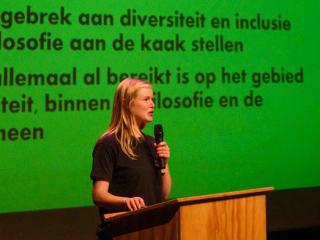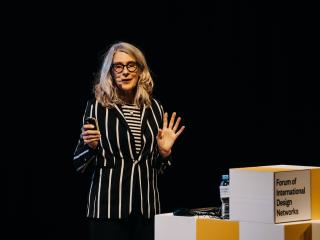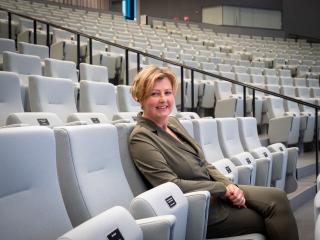Alumnus Joost Dijkstra: From digitalizing the University Library to information analyst at the Olympic Games
Our alumni have interesting careers. What have his studies in Tilburg brought alumnus Joost Dijkstra? For the love of his life, he decided to trade his job as an information analyst at the University Library for a job in Barcelona. There he worked for the Olympic Games. Joost talks about his time as a student, the jobs that followed and the dynamic working environment of the Games.
Joost: “In 1984 I started in an Econometrics program. I passed the first year but not without a struggle. In high school, I had been quite good at math and economics but at the university the level was quite different. I was in a quandary about whether to continue in this program and looked at other programs. Management Information appealed to me: it seemed a lot more interesting. At the time, it was a completely new program. We were with a relatively small group of students and the program was very broadly oriented.”
“My time as a student was rather uneventful. I lived at home with my parents and did not feel the need to strike out on my own. I regret that now. For my graduation project, I did an internship abroad, all the way in Antwerp. People laugh about that, and I understand that: it is really close to home. But Belgium is so different from the Netherlands. I worked at Agfa-Gevaert, that made those film roles. I was engaged in data analysis. After six months, they offered me a job, but I did not accept the offer. My thesis supervisor had a job for me, too, at the university. They were setting up a large European project for which they needed a database analyst. That was a perfect fit for me.”

I was curious what it would be like to be working abroad
From the University Library to Barcelona
“That project ended after three years, so I had to go job hunting. The University Library was in the middle of an innovative transition at the time, which I found very interesting. So I started working there, setting up a digital library for the Schools of Economics and Law. We were trailblazers. Researchers no longer needed to come to the Library if they were looking for a paper. They could just download in on their own computer and print it out themselves. That was a huge change.”
“Since this also was a European project in collaboration with other university libraries, we regularly traveled to different places in Europe for meetings. That is how I met my wife, who is Spanish. That was in 1995; in 1999 I moved to Barcelona. I was curious what it would be like to be working abroad. My wife and I agreed that I would take a year to find out whether I liked it. When I arrived, I had two ‘handicaps’: I didn’t have a job and I didn’t speak the language (neither Spanish nor Catalan). Via the European project, I got a four-month freelance job. In the meantime, I went looking for a new job. In the newspaper, I saw a vacancy at an IT company: they were looking to recruit people for large events, such as the Olympic Games. One of the job requirements was a good command of English. I applied and was hired on the spot.”
We ensured that the journalists working for the IOC were able to upload their reports in a system as quickly as possible. These reports were then forwarded to the major news agencies.
Working on a communication system
“When people think of the Olympic Games, huge and magical, they often think that the International Olympic Committee (IOC) organizes the Games. However, things are different behind the scenes. Whereas the IOC organizes the overarching matters like sponsoring, security, and IT, for example, it is the sports federations that organize the sports events at the local venues, and the local Olympic committee takes care of accreditation, accommodation, tickets, and ceremonies, among other things. The IT company where I worked was responsible for the Games management system, the commentator system, and the applications information system. I worked on that latter system. We ensured that the journalists working for the IOC were able to upload their reports in a system as quickly as possible. These reports were then forwarded to the major news agencies.”
“To continue improving the system, I had a lot of contact with journalists. The system was quite simple, no frills, because the reports had to be submitted as quickly as possible. Approximately 7000 articles were produced in two weeks’ time. That also included very short messages, but it is an indication of how intensively the system was used.”
They are prepared to leap in at the deep end.
Look beyond your own job. Perhaps there are better opportunities elsewhere.
Keep an eye open for opportunities. Life can change in the most unexpected ways.
Dynamic working environment
“I never experienced working as an information analyst at the Olympic Games as stressful. We had three years to work on the system. The third year was devoted to tests, to make sure that it would run smoothly during the Olympic Games. I saw that those test moments were stressful for the programmers because the system had to be operational by the time the Games rolled around. Since sports are different depending on whether it is the Summer of Winter Games and because the rules are different in every country, the system had to be updated continually.”
“In 2004, there was a big reorganization. The IT company, based in Barcelona, decided that the information analysts had to work for four years at the location of the next Olympic Games. That meant that I would have to move to a different country every four years. My wife and I had two young children at the time, so I turned down that offer and I became self-employed. I look back on that job with great pleasure. It has been a wonderful experience. I got to know so many people from different nationalities. It is one way of finding out that people do things differently, but achieve the same result at the end of the day. It has truly enriched my personal development.”
Stay connected
Make sure we have your up to date details.
- Did you not hear from us for a long time?
- Have you recently moved or changed jobs?
- Do you want to stay informed?
Curriculum Vitae
Education
1984 | Pre-university education, Strabrechtcollege, Geldrop
1984-1985 | First year Econometrics, Tilburg University
1985–1989| Management Information, Tilburg University
Work experience
2005 - present: own company in Web Design & Consultancy, Barcelona
1999-2004: Information analyst and Business Consultant at the Olympic Summer and Winter Games, African Games, World Cup Football, SEMA Group Major Events / Schlumberger Ltd, Barcelona
1989-1998: Database/Information analyst/Project manager European DECOMATE projects, Tilburg University
1988 | Information analyst, Agfa-Gevaert, Antwerp
Private
Joost is living just outside Barcelona, ‘on the side of the hills’. He is married to an immunologist from Valencia and they have two children together. Their daughter has recently qualified as an architect and their son is studying International Business. Joost loves traveling, Spanish cuisine, and home-made paella. He set up an annual local second-hand fair, which he also helps organize. In addition, he teaches English at the local senior citizens’ academy.
Also in Tilburg University Magazine
Date of publication: 8 April 2024



